Students Will Tackle Human Rights Problems Through Variety of Internships
More than a dozen Law School students and graduates will spread throughout the United States and the world this summer to undertake prestigious internships that address the world’s most pressing human rights issues.
“Our students have a lot of initiative,” said Associate Professor of Law Deena Hurwitz, who directs the Law School’s International Human Rights Law Clinic and Human Rights Program. “They were tenacious in a competitive world, and were able to get these positions.”
For the fifth year in a row, the International Court of Justice accepted a Law School graduate into its trainee program. Caitlin Stapleton, who will graduate in May, received the Orrick International Law Fellowship, an award dedicated to furnishing up to $40,000 to cover expenses incurred while clerking at the World Court. The award is provided by international law firm Orrick, Herrington & Sutcliffe. Stapleton will assume her nine-month position in September.
“I have talked with a few of the past clerks — UVA has actually been very well represented on the Court as far as clerks are concerned — and asked them a few questions about what it’s like to work in the Court,” Stapleton said. “I’ll work for at least one judge and maybe two, and the work I do will not be that dissimilar from the work domestic clerks do here in the U.S. — writing memos on legal issues, presenting those issues to the judges, conducting a lot of legal research.”
Stapleton spent her first summer in law school interning in Azerbaijan for the U.S. Department of State in Baku. Her work was funded by a grant from the Law School’s Public Interest Law Association (PILA), which provides hundreds of thousands of dollars in grant money to support law students who wish to pursue low- or non-paying public interest legal opportunities each summer.
“Without that grant, [the internship in Azerbaijan] wouldn’t have been possible,” Stapleton said. “It was a fantastic opportunity and great work and it really has a lot to do with why I applied to and why I’m so excited about this clerkship with the ICJ.”
Several other students will also be pursuing summer internships with international tribunals. Rajat Rana, a first-year law student originally from India, will spend the summer at the International Tribunal for the Former Yugoslavia in The Hague, interning for the head of the defense team of Radovan Karadžić, who is on trial for alleged genocide, crimes against humanity and violation of the laws of war in Bosnia-Herzegovina.
“More than the fact of whether he’s guilty or not guilty, I’m concerned that everyone has a right to a fair trial and I thought this would be a really great opportunity,” said Rana, who is also receiving a grant from PILA to support his summer work.
Rana, who holds a M.S. of law from Stanford, previously worked for a judge at the International Criminal Tribunal for Rwanda in Tanzania. He said he is attracted to international criminal law because it’s a relatively new field that is still being defined, and there’s an opportunity to contribute to the development of jurisprudence.
“Everyone deserves a chance to be represented fairly, and my job as a lawyer is to represent objectively the true facts before the court and use the best legal principal to protect him before the court, and whatever the outcome, it’s fine,” he said. “It’s not about winning — it’s about justice.”
First-year law student John Stephens will spend the summer in Johannesburg working for the AIDS Law Project — an opportunity made available by the Law School’s Class of 1957 South Africa Human Rights Summer Fellowship.
Stephens is passionate about AIDS as a human rights issue because it has affected his family. In the late 1990s, Stephens’ parents adopted two Kenyan children, one of whom was in a Children's Home specializing in children orphaned as a result of AIDS and poverty. His whole family, eight in all, became passionate about the issue of HIV/AIDS in Africa, and lived between Africa and the United States for many years. Later, Stephens founded the chapter of the Student Global AIDS Campaign at his undergraduate university, the University of North Carolina, Asheville.
“HIV/AIDS was always part of my consciousness, from the experience of growing up and seeing it. It is something I was aware of,” he said. “It’s one of the most important human rights issues for our generation specifically because it affects our generation. Because it affects people our age, I think it's appropriate for people our age to respond to it."
Without the fellowship that will fund his time in South Africa, Stephens said he would not be able to afford to volunteer his time abroad. Stephens will assist the organization’s attorneys, who work to promote and advance the rights of people living with HIV/AIDS.
“I’m excited about doing some service, and I’m excited I’m going to learn a lot,” Stephens said. “I know I will get experience and develop legal skills, but I also really want the benefits of it to be human in the emotional and relational sense.”
Tricia Cooper, a second-year law student, received both a Monroe Leigh Fellowship in International Law and a PILA grant to support her summer work for Asylum Access in Ecuador.
Cooper worked in Ecuador as an English teacher for a year before she began law school, and will return this summer to work with refugees, most of whom are from Colombia.
“I hope that the refugees that I’m helping will be able to get refugee status in Ecuador so that they don’t have to live in fear of deportation to Colombia, and so they can live a full life with access to schools, banks and medical care and feel like full members of their communities,” Cooper said.
International Human Rights Internships
Class of 1957 South Africa Human Rights Summer Fellowships (2009)
Jennifer Nelson '11, International Center for Transitional Justice (Cape Town)
John Stephens '11, AIDS Law Project (Johannesburg)
Monroe Leigh Fellowships in International Law (2009)
Bilal Ezzedine '10, Institute for International Law and Human Rights (Washington D.C.)
Patricia Cooper '10, Asylum Access (Ecuador)
Orrick International Law Fellow, International Court of Justice (2009-10)
Caitlin Stapleton '09, (The Hague, Netherlands)
International Criminal Tribunal for Rwanda (ICTR)
Benjamin Lee '11
Gary Lawkawski '11
Erik Risendal '11
International Criminal Tribunal for the former Yugoslavia (ICTY)
Raj Rana '11
Emily Higgs '11
Yangho Charles Shin ’11
International Justice Mission, Uganda
Thomas Peyton Smith ’11
U.S. Army Judge Advocate General, AFRICOM in Germany
Michael Wakefield ’10
Institute for International Law and Human Rights, Washington, D.C.
Bilal Ezzedine ’10 (listed above as Monroe Leigh Fellow)
Erin Houlihan ’10
Lawyers Centre for Legal Assistance, Sierra Leone
Estelle Hebron-Jones '11
Human Rights Law Resource Center, Melbourne, Australia
Whitney Blair ’11
Founded in 1819, the University of Virginia School of Law is the second-oldest continuously operating law school in the nation. Consistently ranked among the top law schools, Virginia is a world-renowned training ground for distinguished lawyers and public servants, instilling in them a commitment to leadership, integrity and community service.


